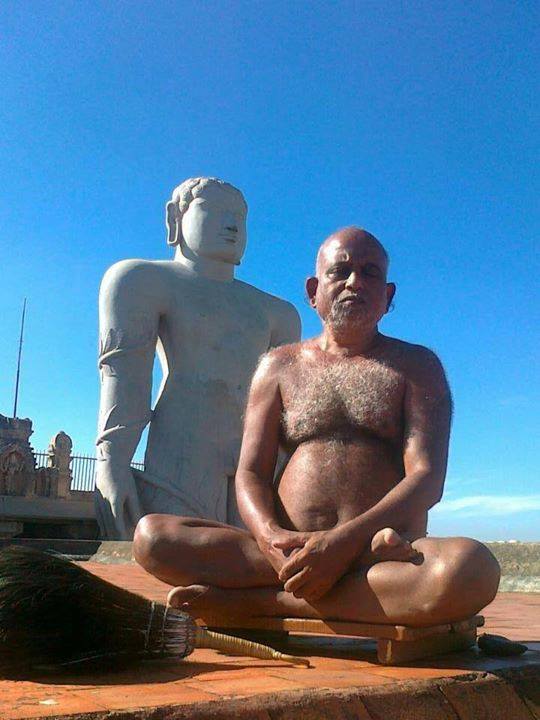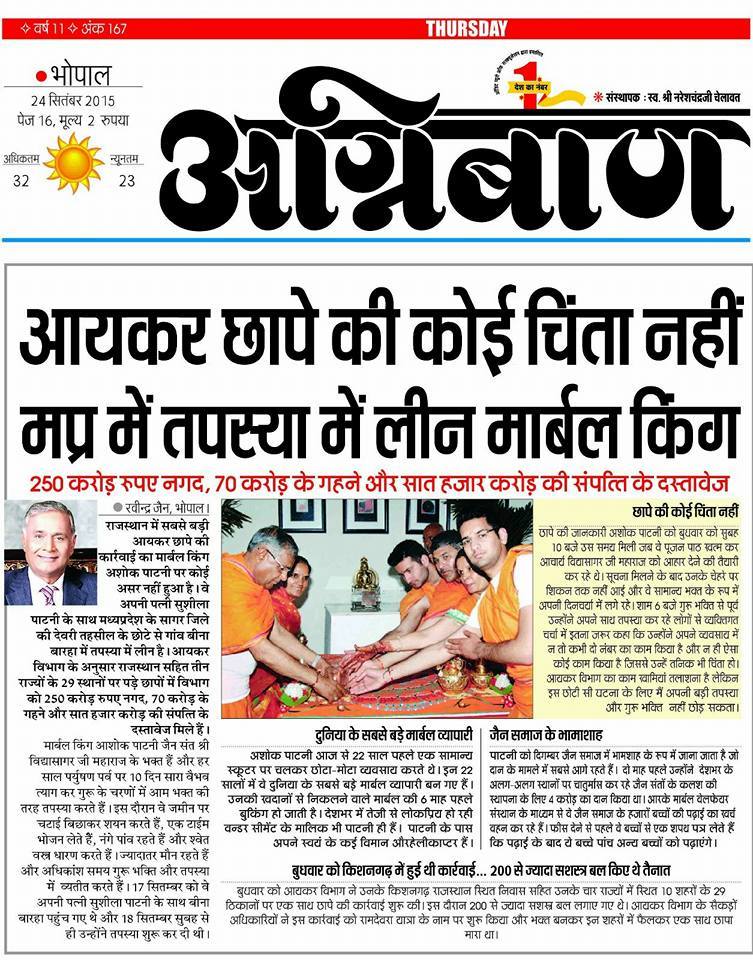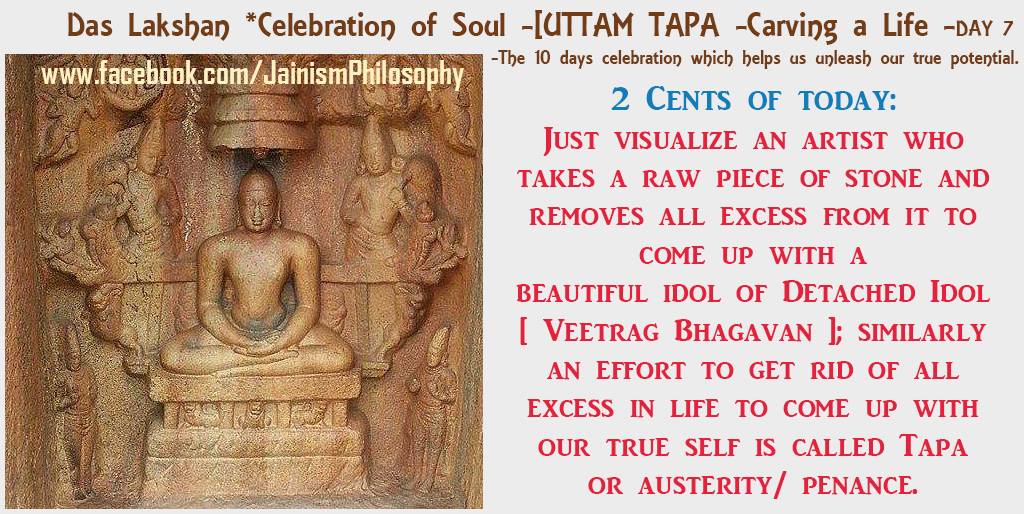Update
 Source: © Facebook
Source: © Facebook
❖ उत्तम तप (SUPREME AUSTERITY) - Austerity/ penance doesn’t cause as much pain as do the mundane luxuries. In fact Tapasya or austerity makes life simple. A mind that has ever growing desires can never be contented. Hindi and English in Both Language! Another worthy reading!
तप शब्द सुनने से हमारे मन में एक भ्रम पैदा होता है क्योंकि एक परंपरागत भ्रम हमारे मन में बैठा हुआ है की तप के मायने हैं बहुत कठिनाई का जीवन जीना. परन्तु तप या तपस्या के असली मायेने हैं ज़िन्दगी को बहुत आसानी से जीना.
हमारा जीवन इच्छाओं का "अक्षय पात्र" है और उनको पूरा करने के लिए हम अपने जीवन में कितनी मुश्किलें खड़ी कर लेते हैं. यदि इच्छाएँ कम हों तो मुश्किलें आसान हो जाएँगी. इच्छाओं को जीत लेने का नाम ही तो तप है. कुछ ऐसी इच्छाएँ हैं जिनसे सिर्फ इन्द्रिय और मन का पोषण होता है. मन भरने की इच्छा हमको मुश्किल में डाल देती है क्यंकि कभी किसी का मन नहीं भरता. फिर क्यों न हम अपनी भौतिक इच्छाओं की पूर्ति से हटकर अपने और दुसरे के जीवन को ऊँचा उठानेवाली परोपकार की भावनाएं अपने भीतर विकसित करें. ये भी तपस्या है. तपस्या को यदि इस तरह हम जीवन में लावें तो कोई बहुत मुश्किल चीज़ नहीं हैं.
तपस्या करने का सही उद्देश्य हमें पता होना चाहिए. कर्मों के छय के लिए, कर्मो की निर्जरा के लिए, अपने जीवन में अज्ञानतावश जो विकृतियाँ हो गई हैं, उन विकृतियों एवं विकारों को हटाने के लिए, कषायों को मंद करने के लिए, अपनी द्रष्टि को निर्मल करने के लिए तपस्या की जाती है. अगर तपस्या का ऐसा उद्देश्य है तब तो तपस्या सार्थक है वर्ना वह तपस्या न हमारे को ऊँचा उठा पाती है न उससे कोई सन्देश मिलता है.
तपस्या यदि गुरु की आज्ञा से, उनके बताये तरीके से की गई हो तब ही वह जीवन को ऊपर उठती है. गुरु ही जानते हैं कि हमारी शक्ति क्या है, हमारा सामर्थ्य क्या है, हमारे लिए क्या उचित है. हमारा जीवन विषय भोग में पड़ा हुआ है और जीवन को विषय भोग जितनी मुश्किल में डालते हैं तपस्या उतनी मुश्किल में नहीं डालती. तपस्या का अभ्यास न होने की वजह से वह शुरू में थोड़ी सी मुश्किल लगती है लेकिन जैसे ही हम उसको अपने जीवन में किसी गुरु के सहारे, अर्थात विधि के अनुसार शुरू कर देते हैं फिर वह तपस्या बहुत आसान हो जाती है.
हमें तपस्या को ठीक ठीक समझकर उससे अपने जीवन में लाभ लेना चाहिए और वाणी का तप, मन का तप, शरीर का तप करते रहना चाहिए. शरीर से झुकना, भगवान् की पूजा करना, गुरुजनों का सम्मान करना - ये शरीर के तप हैं. वाणी का तप है - हमेशा मधुर वचन बोलना, प्रेम से भरकर बोलना, सत्य वचन बोलना, हमेशा जिनेन्द्र भगवान् के कहे वचनों को दोहराते रहना. मन का तप है - हमेशा मन में अच्छे विचार करना/ रखना, मन की प्रसन्नता बनी रहे इस बात का ध्यान रखना. जो व्यक्ति सुख और दुःख में अपने मन की प्रसन्नता को नहीं खोता है वह अपने मन का तप कर रहा है.
हमें आज से ही ऐसी तपस्या शुरू कर देनी चाहिए. हम अपने मन को बाहर की विपरीतताओं में भी प्रसन्न रखेंगे. हम अपने शरीर से हमेशा विनयवान रहेंगे. हमेशा वाणी में मधुरता बनाये रखेंगे, जब भी बोलेंगे आगम की वाणी बोलेंगे. अगर एक एक क्षण रोज़ इस तरह का प्रयास करें तो ये तप हमारे जीवन को अच्छा बना देगा
--- website: ♫ www.jinvaani.org Jainism' e-Storehouse ---
 Source: © Facebook
Source: © Facebook
ये न्यूज़पेपर Cutting जरूर पढ़े... Beyond words Dedication.. Devotion and trust on Jainism and its de facto follower Acarya Sri VidyaSagarJi.. It is all ongoing event is quite thrilling:) ❖ दानवीर श्री अशोक पाटनी को आयकर छापे की कोई चिन्ता नहीं। वे तो आचार्यश्री के चरणों में तपस्या में लीन हैं। ❖
--- website: ♫ www.jinvaani.org Jainism' e-Storehouse ---
News in Hindi
 Source: © Facebook
Source: © Facebook
❖ आज उत्त्तम तप का दिन है... ✿ तन मिला तुम तप करो, करो कर्म का नाश! रवि शशि से भी अधिक है, तुममे दिव्य प्रकाश!! ❖ - आचार्य श्री विद्यासागर जी महाराज ❖
--- website: ♫ www.jinvaani.org Jainism' e-Storehouse ---
 Source: © Facebook
Source: © Facebook
❖ 2 Cents of today: Just visualize an artist who takes a raw piece of stone and removes all excess from it to come up with a beautiful idol of Detached Idol [ Veetrag Bhagavan ]; similarly an effort to get rid of all excess in life to come up with our true self is called Tapa or austerity/ penance. ❖ Paryushan/Das Lakshan *Celebration of Soul -[UTTAM TAPA -Carving a Life -The 10 days celebration which helps us unleash our true potential. DAY 7 ] ❖
Potential (Possibilities) and Efforts: The process of unleashing the infinite potential within is called Tapa. In reality, we do not believe in the infinite potential that we possess and therefore we do not make an effort to unleash it. If we develop this belief in our potential, start believing that we possess infinite possibilities then we might turn to Tapa (austerity).
Earlier we believed that if I get angry it’s because of the circumstances & I cannot help it but go with the flow. But now we have learnt that we can assume forbearance in the moments of extreme anger or rage. Isn’t this an example of our inner potential? If we want, then with some effort we can unleash the infinite potential within. Instead of asking others to give us a magic formula for a better life let’s unleash the real self and live life like a King.
There’s an example - once there was a beggar. He used to sit on the corner of the road. People would take pity on him and give him something or the other. He begged all his life & died one day. Somehow a few people completed his cremation. The place where he used to sit had become dirty so people thought let’s get it cleaned. While cleaning it up, they found something under the place where he used to sit. When they dug it out, they found a pot filled with gold coins sitting on which he begged all his life.
Isn’t it possible that we are also sitting on a life full of potentials and begging others to tell us a way to lead a supreme life?
The way to unleash all such potential & probabilities is called Tapa. We have developed a misconception that Tapa or austerity means leading a very tough life. Whereas Tapasya or penance means living life with simplicity, very smoothly.
Reduce Your Longings/ Desires: We bring a lot many complications in our life just to fulfill our desires, longings. To win over desires is called as Tapa. We have developed many desires that are impossible, that can never be fulfilled. Many desires are just luxurious and not mandatory by any chance. Many desires are materialistic. Just think which of our desires are necessary. Which are the desires we must attempt to fulfill? If we go after desires that are impossible and unjustified then we will end up with undesired complications.
There are some desires that only please our mind and senses. But nothing can actually satisfy our mind. One who has contentment has a satisfied mind. So pull your mind away from materialistic desires and develop feelings that will help you rise in your life and which actually are altruistic.
The Purpose of Tapasya (Austerity): We have adopted a traditional way of doing Tapa. Many people do Tapa these days. Some people fast, some take one meal a day, & some people give up on few Rasas (salt, ghee etc). This is appreciable and is one of the forms of Tapa. But a Tapa without a purpose is of no use.
According to Acharyas [ Ascetic leaders ] we do penance (Tapasya) to reduce our Karmas, to get rid of the false practices we have acquired in our life due to our ignorance or lack of knowledge, to lessen our Kashayas, to purify our vision. If our Tapasya is for such purposes then alone it qualifies to be called Tapsaya otherwise it will be reduced to inflicting penance and suffereing and will be of no help in raising our lives to a new height and nor would it give any message. We sometime don't win over our senses and just started to follow some futile processes in the name of Tapa. It is for this reason that the young generation shrieks away from Tapasya.
Tapasya is not done to get some kind of an award or to get name and fame. Tapasya is not to inflict pain on your body with all such desires. It is for the realization of separation of the soul and body. Sattvik Tapa is the one done under knowledge of Shastras and guidance of Guru. A Guru knows his Shishya like a mother.
Tapa makes life easy: Due to lack of practice, Tapasya may look difficult at first but as soon as we start it with help from a Guru i.e. according to a well guided process Tapasya becomes very easy. We must always practice the Tapa (austerity/ penance) of speech, mind, and body.
Tapa of body means bowing to God with humility, showing our humility and respect towards those who are worth praise. Using and putting our five senses in God’s service & other’s help is called penance of the Body.
Tapa of speech - Speaking pleasant words, speaking words full of love and speaking what is true.
Tapa of the Mind - To always think good for everyone, to make sure we maintain delight & happiness of our mind. A person who doesn’t lose the happiness of his mind in the state of joy or sorrow is actually practicing the Tapa of mind.
Happiness of the mind is also a Tapa: There is a beautiful incidence from Achara Shri Vidyasagarji’s life to describe this statement
Once Acharyashri was on Vihar with the Sangh (commuting from one place to other - Jain Sadhu’s commute on their feet & use no vehicle). The Sangh got late in reaching the decided destination. It got dark one kilometer before the destination as earlier in the day the Sangh had lost its way. The only suitable place for Samayik looked to be the adjoining Paddy field that was open from one side. Whole Sangh sat for Samayik on the ground which had a layer thick layer of Paddy fodder soon to find that paddy fodder itches and the itching is really painful but despite this Sangh carried on with the Samayik. Next to welcome were the mosquitoes, as the place was a bit damp. It was the month of December- time of shivering cold in northern India. By 9-10 PM it became really cold adding to the trouble of all mosquitoes. The Sangh decided to take some rest, after the whole day of Vihar, by lying down on the floor of paddy fodder to catch up with some sleep. The itching was simply very painful and changing the sides while sleeping was just impossible. Paddy fodder, mosquitoes, open field and on top of that shivering December cold.
After some time, all Shravaks (followers) came looking for Acharyashri. But they knew now nothing can be done. All the mats etc used by Sangh had already been transported to the already decided destination, but Sangh couldn’t reach there. Shravaks saw the long fodder pieces lying nearby. Thinking that these would help to reduce the cold somewhat, they put the strips of fodder on the Munis. They were doing it with a good intention but the fodder pieces were very heavy and on top of that they were itching a lot. It was so heavy that Sadhus couldn’t even move it away. Somehow they all spent the night.
When the dawn came, they wanted to get up for Samayik but they couldn’t move the heavy fodder strips. So lying down under the paddy fodder they completed samayik. When people came, they removed all the strips and then only can Munis woke up. All Sadhus were restless, but when they looked at Acharyashri he was still smiling. All Sadhus had thought that he would say something to the people - “What do you people do?” But he was calm and smiling. So everyone resumed the Vihar.
Acharyashri has a delicate body; moreover on his fair complexion the marks of itchy fodder were very visible. When sun rays came out it started to itch & burn some more. But Acharyashri was still the same - calm & smiling. He knew what was going on in the minds of all Sadhus. He said to them - “Look, don’t have any qualms for people’s ignorance. Instead you should thank them for having given us these chances for penance (Tapasya) and to lessen our bondage of Karma.
What a meaningful Sandesh. Such a Sadhu only can be called a Tapasvi (Austere) who has maintained equanimity & happiness of his mind amidst all sorts of pains.
Let’s pray that we achieve such a Tapa of mind and such a happiness of mind that cannot be spoiled by adversity of circumstances.
Article Source: These preaching's by Ascetic Kshamasagara G, efforts to translate into English by Maitree Samooh.
--- website: ♫ www.jinvaani.org Jainism' e-Storehouse ---
